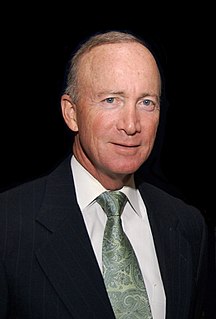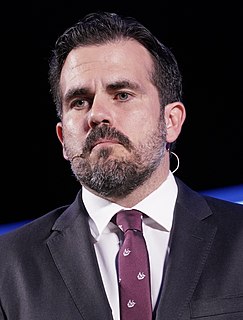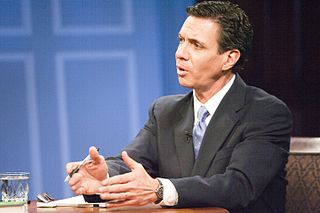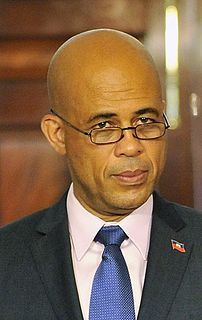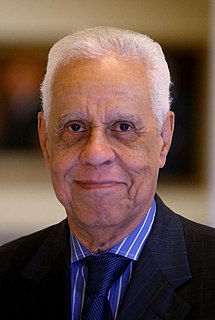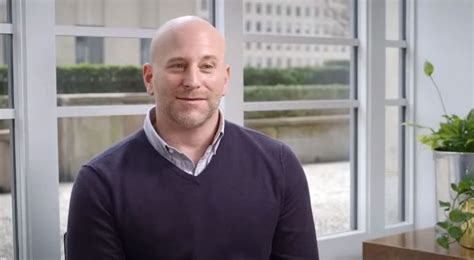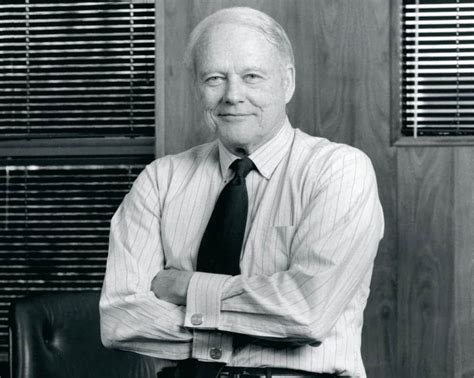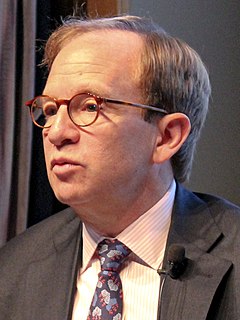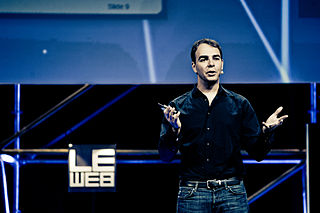Top 892 Investors Quotes & Sayings - Page 13
Explore popular Investors quotes.
Last updated on December 11, 2024.
If our nation goes over a financial Niagara, we won't have much strength and, eventually, we won't have peace. We are currently borrowing the entire defense budget from foreign investors. Within a few years, we will be spending more on interest payments than on national security. That is not, as our military friends say, a 'robust strategy.'
I want to open up investment even further so over the summer we'll launch a consultation on indirect investments in social enterprises - including exploring the possibility of a new scheme based on the success of venture capital trusts which will enable investors to pool their funds to support a variety of social enterprises.
The truth of the matter is that we are being very aggressive, so that we can lay the foundations for investors to come to Puerto Rico, for jobs to be created, and for opportunities to ensue. And our objective, again, is for Puerto Rico, for the people of Puerto Rico who want to stay here, for them to have the opportunity to stay here.
I think what we need is better understanding of how to do risk analysis of a CDO, but that they still can perform a very valuable function because they can aggregate these risks and pass them around so that mortgages or other kinds of loans can be packaged and sold to investors all over the world, who in most times, would justify a small amount of each one.
Our concerns about what we saw in Australia: an economy clearly tied to China has hitched its wagon to the tail of the tiger. In terms of the general complacency, what we heard over and over from investors and clients and potential clients is, 'yes, yes, there are some excesses, but the government will figure out a way.
It's really hard to break through the clutter and get the attention of the top investors, as they typically only look at deals that come in from a warm, credible referral. There's absolutely nothing more credible than getting an endorsement from a well-known subject matter expert who has already put their own money into your company.
The business side of real estate investing is fraught with risk. Unlike purchasing mutual funds or savings bonds, with real estate, you can lose money; this is one of the reasons that seasoned real estate investors caution neophytes never to get too emotional about a property and always be willing to walk away.
When running a Ponzi scheme, how does one avoid enormous, unexpected withdrawals - runs on the bank, so to speak - that would pull back the curtain and reveal a little man blowing smoke? One way would be to attract a core of investors who could be counted on to never withdraw more than a small percentage of principal each year.
From the 1990s onward, the financial sector created a vast array of instruments designed to separate investors from their money, financial derivatives of an ever-increasing level of complexity. At some point, this complexity reached a point where even the creators of the derivatives themselves didn't understand them.
In 2007, there weren't any other accelerators, at least that I was aware of. We were almost the prototypical Y Combinator founders: We were highly technical but had never done a startup before. We also didn't know anyone in the Valley - investors, other entrepreneurs, potential hires. YC seemed like a great way to bootstrap that network.
On the New York Stock Exchange, all buy and sell orders are routed through a single 'specialist,' guaranteeing that most small trades can be matched directly. But most larger trades are delivered to the specialist on the floor of the exchange by human brokers, a system that big investors view as increasingly inefficient.
One of the great strengths of American culture is this empowerment of individual, is the individual being able to be entrepreneurial, create new things. But you create a whole group of people to make great companies. It's employees and investors and customers and partners. The fabric of society, of a network of relations, is key to being successful.
Most startup entrepreneurs unnecessarily spend half their time and give up half their equity in search of funding from angel investors and venture capitalists. Tens of millions of dollars are available to them for free from partners who not only don't want their equity, they don't even want to be paid back.
We have legislated to protect the public from tax rises and guarantee incomes for pensioners, so enshrining in law more protections for consumers, commuters and investors is possible. Enshrining these rights into law would mean that any future government which wanted to reverse this would have to go through the primary legislative process.
If you were at Lehman, the same thing happened. If you were at AIG, the shareholders are getting creamed on these things. And those shareholders are not just a bunch of big shots in Wall Street. Those are pension funds, and those are investors all over the country. I wouldn't worry too much about that. Justice won't be perfect on it.
There's no use diversifying into unknown companies just for the sake of diversity. A foolish diversity is the hobgoblin of small investors. That said, it isn't safe to own just one stock, because in spite of your best efforts, the one you choose might be the victim of unforeseen circumstances. In small portfolios, I'd be comfortable owning between three and ten stocks.
In the end, alchemy, whether it is metallurgical or financial, fails. A base business can not be transformed into a golden business by tricks of accounting or capital structure. The man claiming to be a financial alchemist may become rich. But gullible investors rather than business achievements will usually be the source of his wealth.
Our concerns about what we saw in Australia: an economy clearly tied to China has hitched its wagon to the tail of the tiger. In terms of the general complacency, what we heard over and over from investors and clients and potential clients is, 'yes, yes, there are some excesses, but the government will figure out a way.'
Suppose it was demonstrated that one out of twenty alcoholics could learn to become a moderate social drinker. The experienced clinician would answer, 'Even if true, act as if it were false, for you will never identify that one in twenty, and in the attempt five in twenty will be ruined.' Investors should forsake the search for such tiny needles in huge haystacks.
The governments and the communist parties in Vietnam and China are doing their best to develop their local economies. But the rise of countries in Asia is not in opposition to development and affluence in Western nations. It is a mutually beneficial development. The interests of Western investors are protected in our country. Both we and the West benefit from this in equal measure.
When you say "bank," a bank is a building, a set of computers and chairs and things. The bankers are the people running these banks. They're the chief officers, and they push the loans because they don't care if they go bad. For one thing, they may package these bad loans and sell them off to gullible institutional investors.
Technology tends toward avoidance of risks by investors. Uncertainty is ruled out if possible. People generally prefer the predictable. Few recognize how destructive this can be, how it imposes severe limits on variability and thus makes whole populations fatally vulnerable to the shocking ways our universe can throw the dice.
Smart tech investor thinks about: a) future product roadmap, b) bottoms-up market size & growth, c) talent and skill of team. Essentially you are valuing things that have not yet happened, and the likelihood of the CEO and team being able to make them happen. Finance people find this appalling, but investors who do this well can make a lot of money.
The average American thinks billionaire investors are going to be right based on some talking head. They invest and they have no backup plan. Americans think these guys are giant risk-takers. The truth is they believe in taking as little risk as humanly possible, for the maximum amount of upside. They're looking for that spread of disproportionate risk-reward.
Governments must address inconsistencies in their energy strategies, consider the links with broader economic policies, and stop sending mixed signals to consumers, producers, and investors. In particular, they must assess whether the right regulatory arrangements are in place to allow clean-energy investments to compete on a risk-return basis.
In a flash order transaction, buy or sell orders are shown to a collection of high-frequency traders for just 30 milliseconds before they are routed to everyone else. They are widely considered to give the few investors with access to the technology an unfair advantage, even by some of the marketplaces that offer the flash orders for a fee.
Greece's European neighbors were able step in and bolster the weak foundation on which Greece's free-spending budget was based. It would be difficult for any country, or intergovernmental organization, to rescue an economy the size of the U.S. if investors were ever to lose faith in our bonds because of our enormous debt.
When the founder of World Energy Solutions Inc. assembled his first board in 2000, it consisted of nine investors and friends. The group met quarterly, generally affirming Domaleski's every action. But the Worcester, Mass., company, which auctions electricity and gas credits, lacked customers and financing. It needed more from its board to survive.
Individual security bargains may be located by the process of security analysis practically at any time. They can be bought with good overall results at all periods except when the general market itself is clearly in a selling range for investors. They show up to best advantage during the years in which the market remains in a relatively narrow and neutral area.
'Ick investing' means taking a special analytical interest in stocks that inspire a first reaction of 'ick.' I tend to become interested in stocks that by their very names or circumstances inspire unwillingness - and an 'ick' accompanied by a wrinkle of the nose on the part of most investors to delve any further.
One of the best investors around, Joel Greenblatt, has written a popular, charming and funny book about investing in great companies at low P/E multiples. To simplify an already simple book, great companies are generally measured as companies that can generate lots of profit without requiring a lot of capital. This means that they have high ROEs.
The commission of the investment sins listed above is not limited to 'the little guy.' Huge institutional investors, viewed as a group, have long underperformed the unsophisticated index-fund investor who simply sits tight for decades. A major reason has been fees: Many institutions pay substantial sums to consultants who, in turn, recommend high-fee managers. And that is a fool's game.
Far from being reluctantly propelled into hostilities by popular war fever, leaders incite that fever in order to gather support for their war policies. Thereby do they attempt to distract the public from pressing domestic matters, serve the overseas interests of U.S. investors, justify gargantuan military budgets, and present themselves as great leaders.
One of the ironies of the stock market is the emphasis on activity. Brokers, using terms such as 'marketability' and 'liquidity,' sing the praises of companies with high share turnover... but investors should understand that what is good for the croupier is not good for the customer. A hyperactive stock market is the pick pocket of enterprise.
No one suggested Lehman deserved to be saved. But the argument has been made that the crisis might have been less severe if it had been saved, because Lehman's failure created remarkable uncertainty in the market as investors became confused about the role of the government and whether it was picking winners and losers.
The moment a large investor doesn't believe a government will pay back its debt when it says it will, a crisis of confidence could develop. Investors have scant patience for the years of good governance - politically fraught fiscal restructuring, austerity and debt rescheduling - it takes to defuse a sovereign-debt crisis.
Investors should remember that their scorecard is not computed using Olympic-diving methods: Degree-of-difficulty doesn't count. If you are right about a business whose value is largely dependent on a single key factor that is both easy to understand and enduring, the payoff is the same as if you had correctly analyzed an investment alternative characterized by many constantly shifting and complex variables.
No one would suggest completely ignoring news about your investments. Enron investors, for example, would have been well served to sell once early reports of accounting irregularities surfaced. But the key is to keep news in context and act only if further reflection or study indicates that the core thesis for an investment has changed.
While I take no pleasure in others' misfortunes, we've historically made most of our profits from other investors behaving in a panicked and irrational fashion and selling us certain stocks at prices far below their intrinsic value. More volatility equals cheaper stocks, which equals higher returns.
In a world in which most investors appear interested in figuring out how to make money every second and chase the idea du jour, there's also something validating about the message that it's okay to do nothing and wait for opportunities to present themselves or to pay off. That's lonely and contrary a lot of the time, but reminding yourself that that's what it takes is quite helpful.
The 1969 experience has been a rude awakening for many hedge-fund investors and has left some of them with strong reservations about the whole concept. For the first time in their relatively short history, the funds are not growing: in fact, some have suffered large withdrawals of capital, and a few have actually folded.
We live in a very risky world and investors should not get "carried away" with excessive allocations to equities, or for that matter, real estate. As always asset allocation and low cost and broad diversification will be essential in earning one's fair share of whatever returns our financial markets are generous enough to bestow upon us.
With all that IMF money, the Thailand's and Mexico's are spared the consequences of their fiscal incompetence, and Wall Street's heavy hitters are spared the consequences of their stupid investments. The global economy is a rigged game, rigged so Third World politicians, rich investors and global corporations win - and U.S. taxpayers lose.


